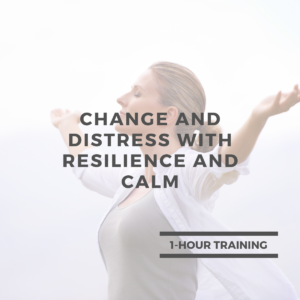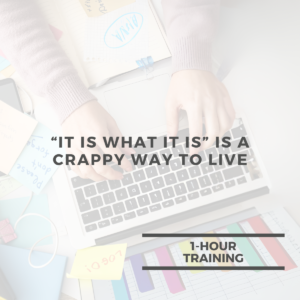It’s Fine? Everything is Fine? Right?
$39.00
May 21st – 9am-10am Central Time
Virtual
In this session, we’ll explore a truth of psychological safety – that, like beauty, it depends on the eye of the beholder. And we’ll cover ways to uncover whether we’re really making a situation safe for others or not. We’ll use current and relevant examples to consultants and leaders, and we’ll begin with a review of the framework of Emotional Intelligence:
- Self-awareness:
- Do you know how you come across, and how you contribute to or detract from spaces of psychological safety?
- Self-management:
- We’ll explore common techniques that can help foster building psychological safety, including mindfulness practices.
- Other-awareness:
- What do you recognize in what people are not saying? How well do you read silences? How well do you pick up on changes in tone or pace or content? We’ll cover tools to help you recognize and ask meaningful questions about changes in behaviors that might indicate that something has changed.
- Relationship management:
- What adjustments can you make in the moment and over time to move relationships forward, even when it’s hard?
Overview:
In this session, we’ll explore a truth of psychological safety – that, like beauty, it depends on the eye of the beholder. And we’ll cover ways to uncover whether we’re really making a situation safe for others or not. We’ll use current and relevant examples to consultants and leaders, and we’ll begin with a review of the framework of Emotional Intelligence:
- Self-awareness: Do you know how you come across, and how you contribute to or detract from spaces of psychological safety?
- Self-management: We’ll explore common techniques that can help foster building psychological safety, including mindfulness practices.
- Other-awareness: What do you recognize in what people are not saying? How well do you read silences? How well do you pick up on changes in tone or pace or content? We’ll cover tools to help you recognize and ask meaningful questions about changes in behaviors that might indicate that something has changed.
- Relationship management: What adjustments can you make in the moment and over time to move relationships forward, even when it’s hard?
We’ll cover a set of coaching questions that can build relationships and create safe spaces.
The foundation of the course will be the four-state framework of Psychological Safety:
- Inclusion Safety – Others feel accepted for who they are
- Learner Safety – People feel safe making mistakes and learning as they grow
- Contributor Safety – Team members feel safe making a meaningful and valued contribution through their skills and abilities
- Challenger Safety – People feel safe speaking up to make things better or to make things right.
Objectives:
By attending this course, participants will:
- Encounter and consider for their own teams the four stages of psychological safety
- Consider common situations and scenarios where safety can be put at risk, and discuss how they might handle that situation and what the possible outcomes might be
- Gain tools and techniques for growing their own emotional intelligence, coaching skills, listening skills, and ability to foster psychological safety
Additional information
| Dates | May 21st |
|---|





